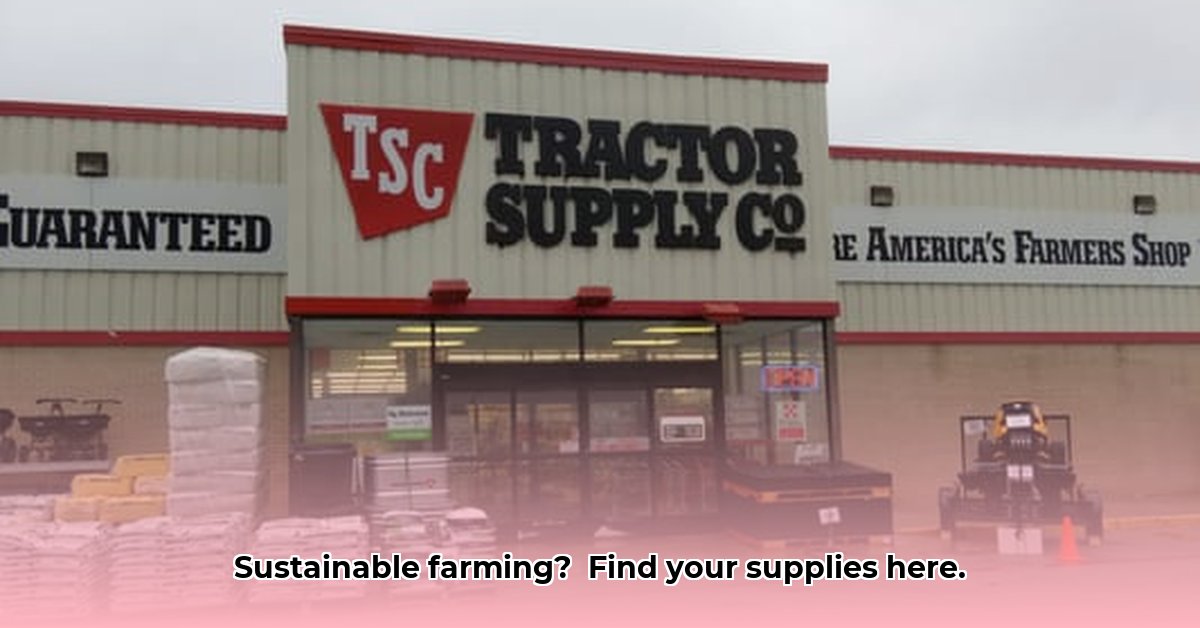
Brownwood Tractor Supply and Sustainable Agriculture: A Balanced Perspective
Brownwood Tractor Supply (BTS) serves as a vital resource for local farmers and gardeners, offering a wide range of products from animal feed to farming equipment. However, the extent of its contribution to sustainable agriculture practices within the Brownwood community warrants careful examination. This article analyzes BTS's positive impacts and limitations, ultimately proposing actionable steps to enhance its role in fostering environmentally responsible farming. Understanding BTS's influence is crucial for shaping a greener future for Brownwood's agricultural landscape. For similar businesses, see this example of a Texas Tractor Supply here.
Positive Impacts: Supporting Sustainable Farming Practices
BTS offers a surprisingly diverse selection of products conducive to sustainable agriculture. Organic seeds cater to the growing demand for eco-friendly gardening and small-scale farming. Water-efficient irrigation equipment, essential in Brownwood's often arid climate, is readily available. Furthermore, the store stocks a variety of animal feeds carrying sustainability certifications, supporting responsible livestock farming. The store's convenient location also serves as a significant advantage, offering many small farmers and home gardeners a one-stop shop for essential supplies. Many customers praise the knowledgeable staff, who often provide valuable advice based on their agricultural expertise.
But are these benefits enough? Let’s dive deeper. How many Brownwood farmers actually utilize these sustainable options? Does BTS proactively promote eco-friendly farming, or is it passively providing the tools?
Limitations: Addressing Challenges in Sustainability
Despite its positive contributions, BTS faces several limitations in its pursuit of sustainable agriculture. A significant concern is the lack of transparency regarding its supply chains. The origins of products and their environmental impact during manufacturing and transportation remain largely unclear. This opacity hinders informed consumer decision-making. The store's emphasis remains predominantly on conventional agricultural products, potentially overlooking the rising demand for sustainably produced goods. The onus of identifying sustainable items falls squarely on consumers, demanding significant effort and research.
This raises a consequential question: How can BTS bridge the gap between supply and demand for sustainable products while ensuring transparency?
Analysis and Recommendations: A Path Towards Improved Sustainability
To strengthen its commitment to sustainable agriculture, BTS must undertake several strategic initiatives. These can be categorized into short-term and long-term goals.
Short-Term Goals (Within the Next Year):
- Conduct a comprehensive supply chain audit: This audit should meticulously assess the environmental and social impact of every product sold, providing a transparent picture of BTS's ecological footprint. This detailed assessment should be completed within the next 12 months, aiming for at least 80% completion.
- Implement a customer education program: BTS could organize workshops and provide readily accessible educational materials on sustainable farming practices. This empowers customers to make informed purchases, driving demand for eco-friendly products.
- Provide staff training on sustainable products and practices: Equipping staff with the necessary expertise allows them to effectively guide customers towards making more sustainable choices. The goal should be to train at least 75% of staff members within six months.
Long-Term Goals (Over the Next 3-5 Years):
- Develop a formal sustainability plan with measurable goals: This plan should include specific, measurable, achievable, relevant, and time-bound (SMART) goals for reducing its carbon footprint, effectively managing waste, and promoting biodiversity. A 20% reduction in carbon footprint within 3 years would be a significant benchmark.
- Expand the range of certified organic and sustainably sourced products: A broader selection of eco-friendly products would cater to the growing consumer demand for sustainable agricultural solutions.
- Collaborate with sustainable suppliers: Partnering directly with suppliers committed to ethical and environmentally sustainable production would guarantee product alignment with BTS’s sustainability goals.
Conclusion: Toward a Greener Future in Brownwood
Brownwood Tractor Supply holds significant potential to become a leader in promoting sustainable agriculture within the Brownwood community. By implementing the recommended short-term and long-term actions, BTS can significantly enhance its positive impact on the environment. These steps, combined with continued community engagement, are crucial for building a more sustainable and resilient agricultural ecosystem for future generations. The success of these efforts will depend on a concerted, collaborative approach, involving not only BTS but also local farmers, gardeners, and government agencies.